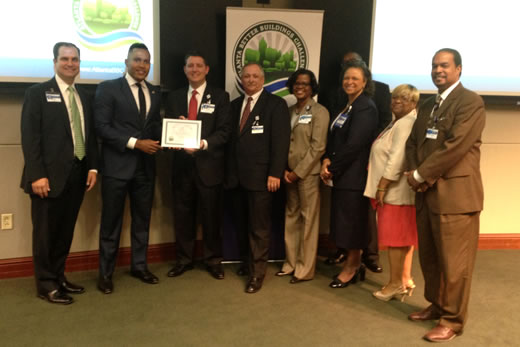Emory University Hospital Midtown (EUHM) is making strides to become more energy efficient in its buildings and structures, with one structure already exceeding its energy reduction goal in just two years. By retrofitting lighting fixtures in the hospital's Summit Parking Deck, the hospital has reduced usage by 31 percent from where it started in 2012. That's when the hospital, which is one of the largest consumers of energy and water in the Downtown and Midtown districts, joined the Atlanta Better Buildings Challenge (ABBC).
Emory University Hospital Midtown, along with some of its partners, showcased its sustainability efforts during a symposium on Thurs., Oct. 2 called "Sustainability Practices in Emory Healthcare," during which Emory staff and administration detailed the hospital's work and progress in energy reduction. An award was also presented to the hospital for its efforts.
The goal of the ABBC is to reduce energy and water consumption by at least 20 percent in participating buildings across Atlanta by 2020, with participation from buildings in the Downtown, Midtown, and Buckhead neighborhoods of Atlanta.
"After receiving energy and water use audits from local consultants, the hospital is now implementing more than 20 energy conservation measures across the hospital, including both facility retrofitting and behavioral changes," says Dane Peterson, CEO of Emory University Hospital Midtown. "We knew that becoming a part of the challenge was the right thing to do."
To compete in the challenge, the hospital entered two facilities; the Summit Parking Deck - the patient and family parking deck - and Emory University Hospital Midtown, which consists of three adjoining buildings and one stand-alone building. Following an audit from Southface, a local energy efficiency and sustainability non-profit, and McKenney's, a mechanical engineering firm, the hospital united with local lighting vendors and energy reduction efforts began.
When the work was complete, Emory University Hospital Midtown received $15,306 in rebates from Georgia Power, another ABBC partner, for retrofitting lighting in the parking deck and the hospital atrium. Other energy conservation measures, such as the retrocommissioning of the hospital (a check-up of the hospital's mechanical systems), will save nearly $350,000 annually, with a grand total of $365,098 in annual savings as a result of measures identified for the ABBC. Staff engagement and behavior change outreach is planned to complement the operational changes already underway.
"Emory University Hospital Midtown has made tremendous progress in its sustainability efforts in just two years in the challenge," says Kelly O'Day Weisinger, program coordinator for Emory's Office of Sustainability Initiatives. "Other energy conservation measures identified by the ABBC audit will continue, and water conservation is an area of focus where we plan to pay more attention. In addition, Emory has internal goals in sustainable food, procurement and landfill waste diversion for which EUHM is making a contribution. All of this work contributes to Emory Healthcare's mission to empower its people to influence change and define a new standard for humankind, in order to be a leader in patient care and sustainability."

The goal of the Atlanta Better Buildings Challenge (ABBC) is to reduce energy and water consumption by at least 20 percent in participating buildings across Atlanta by 2020
In 2011, the Mayor's Office of Sustainability in partnership with Central Atlanta Progress (CAP) and other leading business and community organizations, introduced the Atlanta Better Buildings Challenge. It is a national energy efficiency leadership initiative administered by the Department of Energy. Because of the regional priority for water conservation, Atlanta decided to add water to the goal of 20 percent reduction by 2020.
"We recognize that hospitals face unique challenges in retrofitting buildings systems as they must do so with extreme care, as not to disrupt the continuity of services or compromise patient health," explains Aaron Bastian, spokesperson for the Mayor's Office of Sustainability. "Emory University Hospital Midtown's commitment to sustainability sets the standard for health care facilities in the Atlanta Better Buildings Challenge and we are proud to celebrate their contributions toward our 2020 reduction goals."
"The Atlanta Better Buildings Challenge is successful because of the commitment of its participants," says Shelby Buso', director of sustainability, Central Atlanta Progress, Inc. "Emory University Hospital Midtown stands as a great example of this commitment and should be commended for being at the forefront of its industry when it comes to sustainability."
In July, both Emory University Hospital Midtown and Emory University Hospital went green in their operating rooms (ORs), thanks to a new comprehensive waste management plan. Both hospitals are on a mission to reduce and divert waste by implementing a new recycling program in the ORs by separating clean waste and recycling some used medical equipment. Looking forward to October 26, all seven of Emory's hospitals will celebrate National Food Day by serving meat and poultry that is raised without antibiotics, a routine practice in Emory Healthcare's dining facilities.

